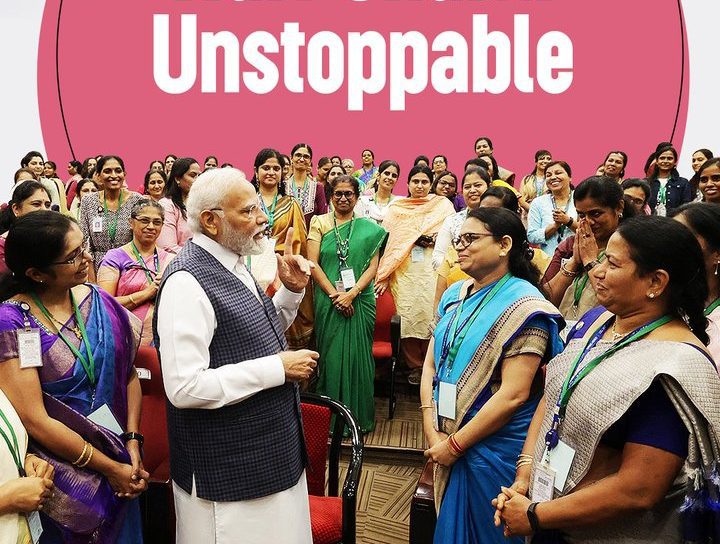Over the past 11 years, under the leadership of Prime Minister Narendra Modi, India has witnessed a transformative shift in women’s empowerment, redefining their role from passive beneficiaries to active nation-builders. With women and children comprising 67.7% of India’s population, the Modi government has made Nari Shakti(women’s power) a cornerstone of national progress, driving policies that empower women across health, education, housing, sanitation, financial inclusion, and leadership. As India strides into Amrit Kaal, women are leading the charge toward a stronger, more inclusive nation.
A Lifecycle Approach to Empowerment
“Women are not just homemakers; they are nation-builders,” Prime Minister Modi has repeatedly emphasized. Since 2014, the government has adopted a comprehensive, lifecycle-based approach to empower women at every stage of life. From landmark legislation like the Nari Shakti Vandan Adhiniyam, which reserves 33% of seats in the Lok Sabha and State Assemblies for women, to schemes like Beti Bachao Beti Padhao and Mission Shakti, the focus has shifted from women’s development to women-led development. These initiatives have boosted women’s participation in education (especially STEM), entrepreneurship, public service, and even defense, fostering inclusive and sustainable growth.
Health and Nutrition: Building a Strong Foundation
The government’s fight against malnutrition has gained momentum through Mission POSHAN 2.0, a ₹1.81 lakh crore initiative (2021–26) targeting children, adolescent girls, pregnant women, and lactating mothers. By integrating nutrition, health, and community efforts, POSHAN Abhiyaan (launched in 2018) uses digital tools like the Poshan Tracker—winner of the Prime Minister’s Award for Excellence in Public Administration 2024—to drive real-time monitoring and behavioral change. As of March 2025, 99.02% of beneficiaries are Aadhaar-verified, and a face authentication module ensures transparency in distributing Take-Home Rations.
Under Mission Saksham Anganwadi, 24,533 Anganwadi Centres (AWCs) have been upgraded into Saksham Anganwadis, with a target of transforming 2 lakh AWCs by 2026. The Poshan Bhi Padhai Bhi initiative has trained 36,463 State-Level Master Trainers and 4,65,719 Anganwadi workers to provide quality pre-school education alongside nutrition. The Suposhit Gram Panchayat Abhiyaan, launched in December 2024, rewards 1,000 Gram Panchayats for exemplary work in improving nutrition outcomes.
Maternal and neonatal care has also seen significant advancements. The Janani Shishu Suraksha Karyakram (JSSK) has supported over 16.60 crore beneficiaries since 2014, reducing out-of-pocket expenses for antenatal and postnatal care. The Janani Suraksha Yojana (JSY) has aided 11.07 crore women by promoting institutional deliveries, while Surakshit Matritva Aashwasan (SUMAN) ensures zero-cost healthcare for pregnant women and newborns in 90,015 certified facilities. The Pradhan Mantri Matru Vandana Yojana (PMMVY) provides ₹5,000 cash benefits to support maternal health, and the Pradhan Mantri Surakshit Matritva Abhiyan (PMSMA) ensures early detection of high-risk pregnancies.
Dignity Through Infrastructure
The Modi government has prioritized dignity in daily life through transformative schemes. Pradhan Mantri Awas Yojana – Gramin (PMAY-G) has provided homes to 2.75 crore beneficiaries, with 73% being women, granting them security and decision-making power. The Pradhan Mantri Ujjwala Yojana (PMUY) has distributed 10.33 crore LPG connections, freeing women from hazardous cooking fumes. The Swachh Bharat Mission has built over 12 crore toilets, ensuring safety and hygiene for women, with 93% reporting reduced fear of harm or infection. The Jal Jeevan Mission has delivered 15.6 crore tap water connections, empowering women by saving time and involving them in water management.
Education and Financial Security
The Beti Bachao Beti Padhao campaign has improved the sex ratio at birth from 918 (2014–15) to 930 (2023–24) and increased girls’ school enrollment to 78% by 2023–24. The Sukanya Samriddhi Yojana (SSY), celebrating a decade in 2025, has opened over 4.2 crore accounts, securing the financial future of girls.
Women in Leadership
Women are breaking barriers across sectors. The first batch of female cadets graduated from the National Defence Academy in May 2025, and women have played pivotal roles in missions like Chandrayaan-3. India leads globally in female STEM graduates and pilots. Legal reforms such as the abolition of Triple Talaq, the proposal to raise the minimum marriage age for women from 18 to 21 years, and the extension of maternity leave to 26 weeks have significantly advanced women’s empowerment in India. These measures have supported greater access to education and employment for women, while also promoting their health and well-being. Additionally, the abrogation of Article 35A has granted women in Jammu & Kashmir equal property rights, further strengthening gender equality in the region.
Economic Empowerment
The Pradhan Mantri MUDRA Yojana (PMMY) has sanctioned ₹34.11 lakh crore across 52.5 crore loan accounts, with 68% benefiting women entrepreneurs. The Stand-Up India Scheme has provided over ₹47,704 crore to 2.04 lakh women borrowers. The Deendayal Antyodaya Yojana – National Rural Livelihoods Mission (DAY-NRLM) has mobilized 10.05 crore women into 90.90 lakh Self-Help Groups, with the Lakhpati Didi Initiative enabling 1.48 crore women to earn ₹1 lakh annually.
Safety and Security: Mission Shakti
Mission Shakti, with its Sambal and Samarthya pillars, ensures women’s safety and self-reliance. Sambal includes 819 operational One Stop Centres (OSCs), assisting 10.98 lakh women, and the Women Helpline, handling 214.78 lakh calls. The SHe-Box Portal addresses workplace harassment, and Nari Adalat promotes women-led justice at the grassroots. Samarthya supports 2.92 lakh women through Shakti Sadan and 5.07 lakh through Sakhi Niwas. The AbKoiBahanaNahi campaign, launched in November 2024, combats gender-based violence.
A New Era for Nari Shakti
Over the past decade, the Modi government has transformed women’s welfare into a movement of leadership and agency. From space missions to grassroots governance, Indian women are shaping the nation’s destiny.














